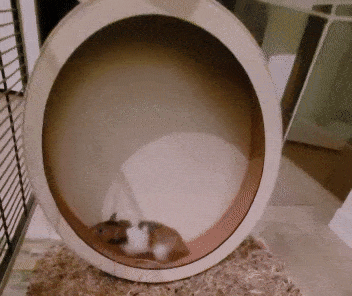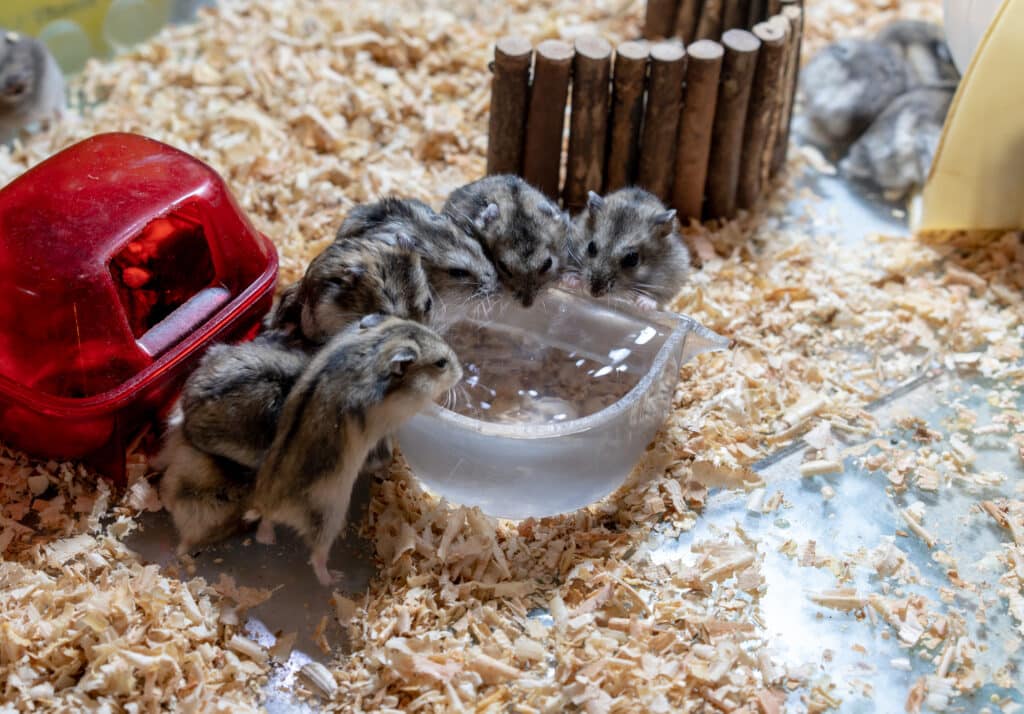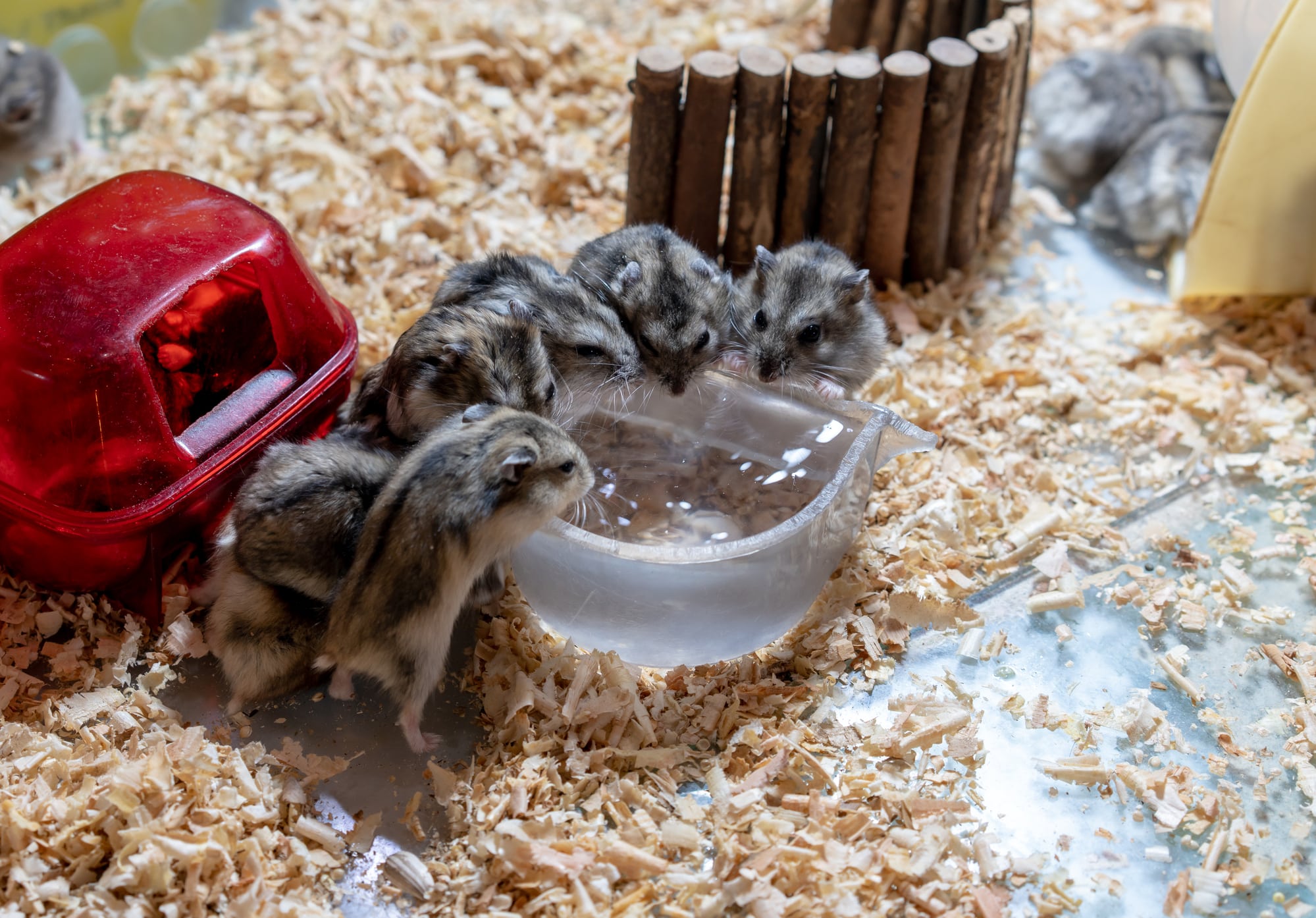If your hamster is sick, he may not be able to convey it to you vocally. But he shows many symptoms using which you can figure out what is wrong with your hamster. One such symptom is drinking too much water. In this blog post, find out why your hamster is drinking too much water and what to do about it.
How much water do hamsters drink?
Water helps your hamster’s body digest the food he eats and removes the toxins that are produced in his body. So, hamsters need to drink water. But unlike humans, who need to drink about two liters of water every day to stay healthy, hamsters don’t need to drink a lot of water. Indeed, on average, a hamster drinks only about 8.5ml of water/100g of body weight per day.
The exact amount can vary depending on the hamster’s species and gender. For more information, read: How much water do hamsters drink?
So, if you notice your hamster drinking much more water and that too all of a sudden, it might be due to any of the following reasons:
Why is your hamster drinking so much water?
1. Dehydration
Water is one of the primary constituents of an animal’s body and plays a major role in its survival. When an animal loses more fluid than it takes in, dehydration occurs. Dehydration can upset the balance of minerals in the body affecting its normal functioning (Source: National Health Information Service, Scotland).
Dehydration is one of the primary causes behind your hamster drinking excessive water. When a hamster is dehydrated, he can start drinking more water to compensate for the loss of fluids. Dehydration can occur due to the following reasons:
i) You have just brought your hamster home
When you bring your hamster to your home for the first time, the environment will be entirely new for him. So, he might be stressed and feel scared. Therefore, he might not come out of his nest to drink water. If that happens, he will get dehydrated.
This is what happened when we brought our male Syrian hamster Hum home. When we let him inside the cage, he ran everywhere to explore the cage. Then, once he found a hideout, he hid there and did not come out, not even to drink water. He came out only at night when we switched off the lights, and everything went silent.
But once a hamster passes this initial stage and gets comfortable in his new home, he may start drinking more water than before to compensate for the loss of fluids.
ii) The cage is too hot
Unlike humans, hamsters cannot sweat. So, they cannot maintain their core body temperatures as effectively as humans.
Ideally, the room temperature should be between 18°C and 24°C for a hamster to live healthily. If the room temperature falls below 18°C, they can get cold or start hibernating; if it exceeds 24°C, your hamster can get dehydrated and suffer heatstroke.
Therefore, keeping the room temperature between 18°C and 24°C at all times is indispensable. But sometimes, especially in the summer, the hamster cage can get too hot. If that’s the case, your hamster might drink more water than usual to cool his body. Keep a Thermometer near the cage (if possible inside the cage) to monitor the cage’s temperature. I bought a Govee Thermometer Hygrometer from Amazon for this purpose. It monitors both the temperature as well as the humidity in the cage.

iii) Your hamster is very active
When they are young, hamsters are very active. So, they will keep exploring their cage and running on their wheels. Our hamster Hum wakes up at around 21:00 (We bought him just two weeks ago, so this might change). It takes him one hour for him to become active. Until then, he comes out of his hideout, looks for food, eats it, then returns to the hideout to groom himself and sleep again.
Around 22:00, he becomes active and starts running in the hamster wheel. He keeps running until 04:30. The way he runs surprises me. If I were to run a 100m sprint at full speed, I would have to rest for at least a few seconds before I run again. But this guy is completely different. He keeps sprinting in the wheel for minutes at an end. He will stop in between, look outside, then start running again.

What I mean to tell you is that, unlike (most) humans, hamsters are extremely active creatures. Now, if you remember how the human body works when you run, your body gets heated up. So, to keep your internal temperature at 37°C, your body releases heat by sweating. If we don’t sweat, our bodies will cook from the inside out (Source: Henry Ford Health).
But unlike us, hamsters don’t have sweat glands. So they cannot sweat. So they don’t lose water by sweat. However, they do lose water in the form of urine. And since exercising leads to an increased rate of urine production (so that the body can get rid of the toxins produced in the body during exercising), an active hamster will lose water in the form of urine and get dehydrated.
So, he will drink more water after exercising. Our hamster Hum is no different. Often, after he runs in the wheel, he will walk around the cage, explore things, and go to one of his hideouts (probably to pee, I don’t know – But this hideout of his smells bad. So, I assume that he goes there to pee) and then go drink water. Of course, it is not much water, but he will drink water often after exercising.
iv) His diet contains too much salt.
Kidneys filter out the waste in the blood and decide how much water should stay in the body and how much should be filtered out as urine. It is also the role of the kidneys to maintain a special ratio of electrolytes (sodium, potassium, etc.) to water in the body.
Table salt is almost 50% sodium, i.e., a teaspoon (approximately 4.2 grams) of table salt contains about 2.3 grams of sodium (Source: Texas A&M University).
So, if you consume more sodium, the body will try to increase the water in the body to maintain the ratio. This will cause problems like edema which causes swelling in the hands, legs, ankles, etc (Source: Popular Science). You will also feel thirsty and start drinking more water. If you don’t drink more water, however, it can be even more dangerous because, in that case, your kidneys will be forced to draw water from the cells in the body, causing dehydration.
For small creatures like hamsters, it is not advisable to give any salt at all. However, if his diet does contain salt, his body could undergo the changes mentioned above (just like humans). He might get dehydrated and drink excessive amounts of water. So, do not add salt to your hamster’s diet.
v) He had diarrhea
Diarrhea in hamsters is not that uncommon. Hamsters, especially when they are young or stressed, are prone to it. Diarrhea can be deadly for hamsters since it can quickly escalate and cause Wet Tail, a dangerous condition that can cause death within 48 hours.
If your hamster has diarrhea, he might lose a lot of water in his body, causing dehydration. So, he might drink more water to compensate for the water loss.
2. Medical issues
Besides dehydration, other medical issues/illnesses can make your hamster drink excessive water. These illnesses are:
i) Diabetes
The hormone called insulin moves the sugar in the blood to body cells to be used immediately for energy or to be stored for later use. When the body fails to secrete a sufficient amount of insulin or loses its ability to use insulin effectively, it causes the blood sugar levels to spike. This condition is called diabetes (Source: Healthline).
When the sugar levels spike, the kidney filters the blood and tries to flush the excess amount of glucose (in the blood) from the body in the form of urine. So, if your hamster has diabetes, his kidneys will work harder and produce more urine. As he loses more water from his body, your hamster will start feeling thirsty and drink more water.
Increased urination, excessive thirst, extreme fatigue, and weight loss are some of the symptoms of diabetes.
If your hamster has diabetes, you should not give him any fruits. You should also avoid other food items that are rich in carbohydrates.
ii) Urinary Tract Infections
Urinary tract infections are much more common in hamsters than in humans. Since hamsters are naked and their genitals are very close to the ground, harmful pathogens can easily enter their bodies through their urethra and damage their urinary tracts. Female hamsters are more prone to Urinary tract infections than male hamsters.
If a hamster has contracted a Urinary tract infection, his tiny body will try to flush out the pathogens by drinking more fluids and urinating more. But just because a hamster is drinking more water, it doesn’t mean that he has a urinary tract infection. You have to look for other symptoms like lack of appetite, lethargy, and excessive thirst. More importantly, your hamster’s pee could also be thick and contain blood traces, and your hamster might squeak while peeing because it is painful to pee.
Urinary tract infections can be caused by unhygienic living conditions, stress, and obesity.
If you have made sure that your hamster is suffering from a Urinary tract infection, give your hamster lots of water. A small amount of yogurt can also help flush out the bacteria. These measures may make your hamster’s situation better, but they cannot make the infection go away. Indeed, Urinary tract infections seldom go away on their own. So, you have to take your hamster to a vet as soon as possible.
iii) Kidney disease/failure
Just like Urinary tract infections, kidney diseases could also make a hamster drink too much water.
One of the main reasons for kidney failure in hamsters are structures called amyloids. Amyloids are formed when some proteins lose their structure and function and deposit within and around body cells (Source: Wikipedia). There are also functional amyloids that benefit the human body, like sorting, storing, and releasing hormones, improving long-term memory, etc. (Source: PubMed).
However, there are also disease-associated amyloids that are associated with more than 20 human diseases like Parkinson’s, Alzheimer’s, Type-II Diabetes, etc. They also cause Amyloidosis, which is caused when these amyloids build up in tissues or organs (Source: WebMD).
When these amyloids are localized in one or both of your hamster’s kidneys, they cause kidney disease.
Too much heat can also cause kidney failure. This is usually caused by cystitis (bacteria from poo getting into the urethra) reaching the kidneys and accumulating there.
A hamster suffering from kidney disease/failure will urinate more often and drink more water (Source: Caring Pets). Other symptoms of kidney disease include blood in urine, fur loss, weight loss caused by the loss of protein through urine, sticky eyes, and swollen abdomen caused by water retention.
Kidney disease can kill a hamster. So, if you notice any of the above symptoms, you should take your hamster to a vet as soon as possible.
iv) Pyometra
Pyometra is another deadly condition in hamsters. It affects the uterus of female hamsters. During the estrus cycle of a hamster, her body secretes uterine fluids. These fluids create a suitable environment for bacteria to grow and flourish.
If harmful bacteria or virus infects her during this time, blood or pus can accumulate in her uterus. At times, this accumulated fluid can come out of her body.
Pyometra is dangerous and can affect hamsters of any age, even though it is more common among older female hamsters.
If your hamster suffers from pyometra, she will drink more water than usual. Other symptoms of pyometra include hunched back, lethargy, and increased urination.
Unfortunately, there is no home remedy for pyometra. You should take your hamster to a vet if you think your hamster has pyometra.
Antibiotics can provide temporary relief against pyometra. Painkillers can also help reduce the pain. However, antibiotics cannot cure pyometra. Surgery is the only cure. However, if your hamster is too old and cannot survive the surgery, you may have to consider Euthanasia.
v) Cushing’s disease
Cushing’s disease is caused due to the overproduction of cortisol. Cortisol is the primary stress hormone of the body and is produced by the adrenal glands. Increased production of cortisol can curb normal bodily functions that are not needed in a fight-or-flight situation.
If your hamster suffers from Cushing’s disease, he will drink more water. Other symptoms of Cushing’s disease are increased appetite, a sagging abdomen, and thin, balding skin (Source: Supreme Pet Foods).
Cushing’s disease is not common in hamsters and is often mistaken for diabetes. So, your vet might conduct a blood or urine test to first rule out diabetes.
The symptoms of Cushing’s disease are often visible but not painful. So, you should decide if your hamster needs any treatment at all. If you do decide to go for treatment, your vet might prescribe medications.
3. Other reasons
If your hamster is drinking a lot of water, it doesn’t necessarily have to be a bad thing. Sometimes your hamster drinks more water because of his lifestyle or because of some irrelevant reasons. Some of these reasons are:
i) You give your hamster a diet comprised of dry foods
Most hamster species have evolved in hot and dry conditions where water is scarce. So, they have evolved to extract water from the food they eat. Therefore, if you provide your hamster with vegetables and fruits, which are often rich in water, your hamster’s body will extract water from these food items. Hence, he will only drink a little water.
However, if you provide your hamster with a dry food diet comprising of the commercially available hamster seed mix and nuts, seeds, and grains, which do not contain much water, your hamster will drink more water.
ii) Your hamster is pregnant
If your female hamster has been with a male lately and suddenly starts consuming more water and food, she might be pregnant. If that’s the case, you should keep enough water and food for your pregnant hamster.
You should also provide sufficient protein to your hamster. Boiled egg whites and boiled chicken without added salt or spices can be helpful in this case.
You should also give your hamster enough space and not touch her or her babies until the babies are at least four weeks old.
iii) Your hamster is bored
Hamsters that lack mental stimulation and feel bored might also drink more water.
If you notice other symptoms of boredom besides drinking more water, like climbing the bar cages, biting the bar cages, etc., you should try to keep your hamster engaged. Buy a cage that is big enough for your hamster and keep enough toys and chew toys in the cage.
Taming your hamster can also go a long way in preventing your hamster from getting bored. It can also help you develop a deep bond with your hamster.
How to prevent your hamster from drinking too much water?
As we saw above, your hamster drinking too much water is in itself not a problem. It might be an indicator of a bigger health issue that could become dangerous for your hamster in the long run. So, look for other symptoms to find out if there is something wrong with your hamster or if it isn’t dangerous at all.
More often than not, your hamster might be dehydrated, and drinking more water can solve the issue. So, you should provide clean, fresh water to your hamster every day. If you are wondering how to give water to your hamster (water bottles or water bowls?), read this blog post: Can hamsters drink out of a bowl?
Conclusion
Hamster owners often become concerned due to the excessive drinking habit of their hamsters. But in all reality, your hamster’s excessive drinking habit is not a problem by itself. It could just be a symptom of:
- Dehydration is caused by stress, overheating, increased physical activity, excess salt in the diet, and digestive issues like diarrhea.
- Health issues like diabetes, urinary tract infections, kidney disease, pyometra, and Cushing’s disease.
But healthy hamsters might also drink excessive water when their diet is comprised mostly of dry foods or if they are pregnant. At times, even hamsters that are bored might drink excessive water.
So, do not panic if your hamster drinks too much water. First, provide clean water every day to your hamster. Then, look at the symptoms and find out if the excessive drinking is caused by a medical issue or if it is just normal hamster behavior. Then decide on the appropriate course of action.



